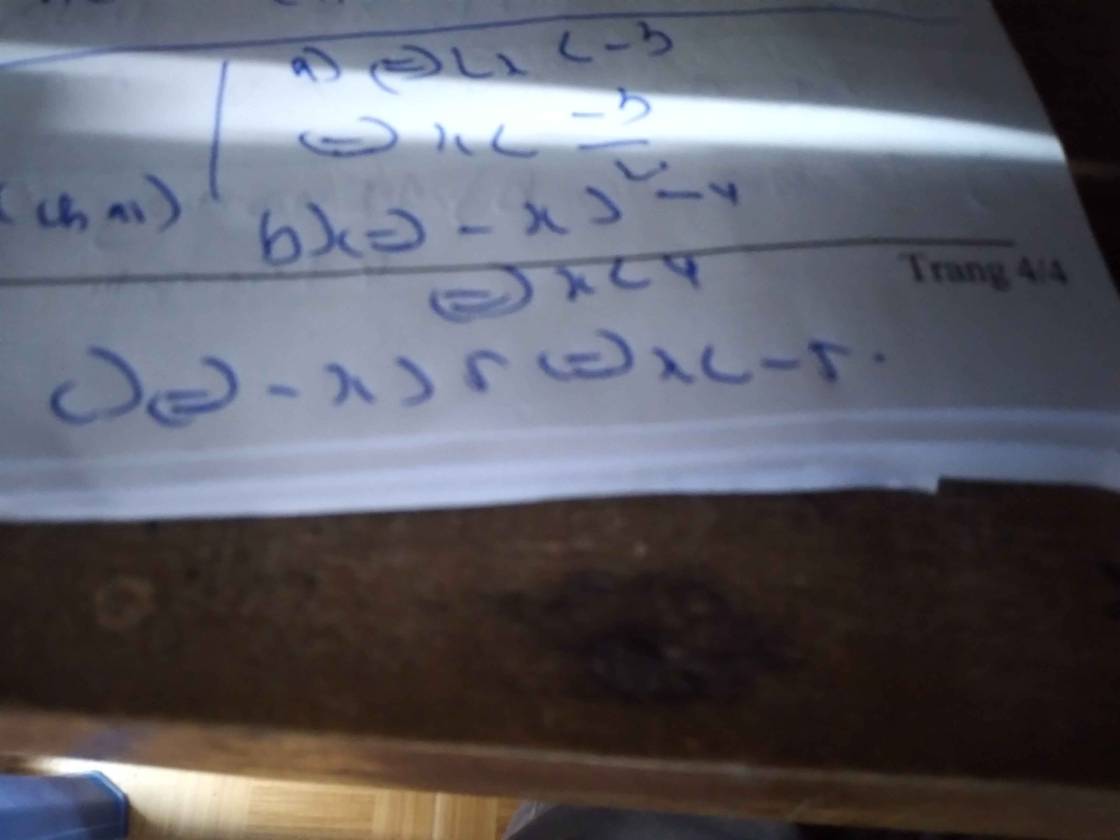GIải phương trình: (2x-8)3 +( 4x+13)3= ( 4x+2x+)3

Những câu hỏi liên quan
Giải các phương trình sau:a)
2
x
−
1
3
+
6
3
x
−
1
2
2
x
+
1
3
+
6...
Đọc tiếp
Giải các phương trình sau:
a) 2 x − 1 3 + 6 3 x − 1 2 = 2 x + 1 3 + 6 x + 2 3 ;
b) x − 2 2 + 3 − 2 x 2 − 4 x − 4 x − 5 = x + 3 2 ;
c) x − 3 + 2 x − 3 − 1 3 = 3 − x 4 ;
d) x + 4 3 − 1 7 = 2 − x 7 + x 3 + x + 1 .
giải bất phương trình
1)2x+3<0
2)3x-8>4x-12
3)3x-2>4x+3
Giải phương trình:
1: \(\left(x^2+2\right)^2+4\left(x+1\right)^3+\sqrt{x^2+2x+5}=\left(2x-1\right)^2+2\)
2: \(\left(13-4x\right)\sqrt{2x-3}+\left(4x-3\right)\sqrt{5-2x}=2+8\sqrt{16x-4x^2-15}\)
3x^3+2x^2+2x+3=8
(x^2-4x)^2+2(x^2-4x)^3-8=0
Giải hộ tớ cái phương trình
1)3(x^3+1) + 2x(x+1)=8
suy ra : 3(x+1)(x^2 +x+1) + 2x(x+1) =8
suy ra : (x+1) ( 3( x^2+x+1) +2x) -8 =0
suy ra : (x+1) ( 3x^2 +3x+3+2x) -8 =0
mk ko bt nữa
giải phương trình: (2x-3)^2 = 4x^2-8
\((2x-3)^{2}=(4x)^2-8 =(4x)^{2}-12x+9=(4x)^{2}-8 =(4x)^{2}-12x+9-(4x)^{2}+8=0 =12x+17=0 =12x=-17 =x=\dfrac{-1}{12}\)
Đúng 0
Bình luận (6)
`(2x-3)^2 = 4x^2-8`
`<=> 4x^2 - 12x + 9 = 4x^2-8`
`<=> 4x^2 - 12x + 9-4x^2 +8=0`
`<=> -12x + 17=0`
`<=>-12x=-17`
`<=> x= 17/12`
vậy phương trình có nghiệm \(S=\left\{\dfrac{17}{12}\right\}\)
Đúng 0
Bình luận (0)
\(\left(2x-3\right)^2=4x^2-8\)
\(\Leftrightarrow4x^2-12x+9=4x^2-8\)
\(\Leftrightarrow4x^2-12x+9-4x^2+8=0\)
\(\Leftrightarrow17-12x=0\)
\(\Leftrightarrow12x=17\)
\(\Leftrightarrow x=\dfrac{17}{12}\)
\(\text{Vậy phương trình có tập nghiệm là }S=\left\{\dfrac{17}{12}\right\}\)
Đúng 0
Bình luận (0)
giải phương trình sau (2x^2 +1)^2-16(x+3)^2+11(2x^2+4x+13)=0
giải phương trình:
a) \(\sqrt{4x^2+4x+3}=8\)
b) \(\sqrt{5x^3+5x^2+7}=9\)
c) \(\dfrac{3}{5}\sqrt{x^5+4x^3+2x^2}=18\)
a: Ta có: \(\sqrt{4x^2+4x+3}=8\)
\(\Leftrightarrow4x^2+4x+1+2-64=0\)
\(\Leftrightarrow4x^2+4x-61=0\)
\(\Delta=4^2-4\cdot4\cdot\left(-61\right)=992\)
Vì Δ>0 nên phương trình có hai nghiệm phân biệt là:
\(\left\{{}\begin{matrix}x_1=\dfrac{-4-4\sqrt{62}}{8}=\dfrac{-1-\sqrt{62}}{2}\\x_2=\dfrac{-4+4\sqrt{62}}{8}=\dfrac{-1+\sqrt{62}}{2}\end{matrix}\right.\)
Đúng 0
Bình luận (1)
Giải phương trình:1. x^4-6x^2-12x-802. dfrac{x}{2x^2+4x+1}+dfrac{x}{2x^2-4x+1}dfrac{3}{5}3. x^4-x^3-8x^2+9x-9+left(x^2-x+1right)sqrt{x+9}04. 2x^2.sqrt{-4x^4+4x^2+3}4x^4+15. x^2+4x+3sqrt{dfrac{x}{8}+dfrac{1}{2}}6. left{{}begin{matrix}4x^3+xy^23x-y4xy+y^22end{matrix}right.7. left{{}begin{matrix}sqrt{x^2-3y}left(2x+y+1right)+2x+y-505x^2+y^2+4xy-3y-50end{matrix}right.8. left{{}begin{matrix}sqrt{2x^2+2}+left(x^2+1right)^2+2y-100left(x^2+1right)^2+x^2yleft(y-4right)0end{matrix}right.
Đọc tiếp
Giải phương trình:
1. \(x^4-6x^2-12x-8=0\)
2. \(\dfrac{x}{2x^2+4x+1}+\dfrac{x}{2x^2-4x+1}=\dfrac{3}{5}\)
3. \(x^4-x^3-8x^2+9x-9+\left(x^2-x+1\right)\sqrt{x+9}=0\)
4. \(2x^2.\sqrt{-4x^4+4x^2+3}=4x^4+1\)
5. \(x^2+4x+3=\sqrt{\dfrac{x}{8}+\dfrac{1}{2}}\)
6. \(\left\{{}\begin{matrix}4x^3+xy^2=3x-y\\4xy+y^2=2\end{matrix}\right.\)
7. \(\left\{{}\begin{matrix}\sqrt{x^2-3y}\left(2x+y+1\right)+2x+y-5=0\\5x^2+y^2+4xy-3y-5=0\end{matrix}\right.\)
8. \(\left\{{}\begin{matrix}\sqrt{2x^2+2}+\left(x^2+1\right)^2+2y-10=0\\\left(x^2+1\right)^2+x^2y\left(y-4\right)=0\end{matrix}\right.\)
1.
\(x^4-6x^2-12x-8=0\)
\(\Leftrightarrow x^4-2x^2+1-4x^2-12x-9=0\)
\(\Leftrightarrow\left(x^2-1\right)^2=\left(2x+3\right)^2\)
\(\Leftrightarrow\left[{}\begin{matrix}x^2-1=2x+3\\x^2-1=-2x-3\end{matrix}\right.\)
\(\Leftrightarrow\left[{}\begin{matrix}x^2-2x-4=0\\x^2+2x+2=0\end{matrix}\right.\)
\(\Leftrightarrow x=1\pm\sqrt{5}\)
Đúng 5
Bình luận (0)
3.
ĐK: \(x\ge-9\)
\(x^4-x^3-8x^2+9x-9+\left(x^2-x+1\right)\sqrt{x+9}=0\)
\(\Leftrightarrow\left(x^2-x+1\right)\left(\sqrt{x+9}+x^2-9\right)=0\)
\(\Leftrightarrow\sqrt{x+9}+x^2-9=0\left(1\right)\)
Đặt \(\sqrt{x+9}=t\left(t\ge0\right)\Rightarrow9=t^2-x\)
\(\left(1\right)\Leftrightarrow t+x^2+x-t^2=0\)
\(\Leftrightarrow\left(x+t\right)\left(x-t+1\right)=0\)
\(\Leftrightarrow\left[{}\begin{matrix}x=-t\\x=t-1\end{matrix}\right.\)
\(\Leftrightarrow\left[{}\begin{matrix}x=-\sqrt{x+9}\\x=\sqrt{x+9}-1\end{matrix}\right.\)
\(\Leftrightarrow...\)
Đúng 5
Bình luận (2)
2.
ĐK: \(x\ne\dfrac{2\pm\sqrt{2}}{2};x\ne\dfrac{-2\pm\sqrt{2}}{2}\)
\(\dfrac{x}{2x^2+4x+1}+\dfrac{x}{2x^2-4x+1}=\dfrac{3}{5}\)
\(\Leftrightarrow\dfrac{1}{2x+\dfrac{1}{x}+4}+\dfrac{1}{2x+\dfrac{1}{x}-4}=\dfrac{3}{5}\)
Đặt \(2x+\dfrac{1}{x}+4=a;2x+\dfrac{1}{x}-4=b\left(a,b\ne0\right)\)
\(pt\Leftrightarrow\dfrac{1}{a}+\dfrac{1}{b}=\dfrac{3}{5}\left(1\right)\)
Lại có \(a-b=8\Rightarrow a=b+8\), khi đó:
\(\left(1\right)\Leftrightarrow\dfrac{1}{b+8}+\dfrac{1}{b}=\dfrac{3}{5}\)
\(\Leftrightarrow\dfrac{2b+8}{\left(b+8\right)b}=\dfrac{3}{5}\)
\(\Leftrightarrow10b+40=3\left(b+8\right)b\)
\(\Leftrightarrow\left[{}\begin{matrix}b=2\\b=-\dfrac{20}{3}\end{matrix}\right.\)
TH1: \(b=2\Leftrightarrow...\)
TH2: \(b=-\dfrac{20}{3}\Leftrightarrow...\)
Đúng 3
Bình luận (0)
Xem thêm câu trả lời
Giải các phương trình sau:a)
3
x
−
1
+
4
x
−
2
5
x
−
3
+
6
x
−
4
;
b)
2
x...
Đọc tiếp
Giải các phương trình sau:
a) 3 x − 1 + 4 x − 2 = 5 x − 3 + 6 x − 4 ;
b) 2 x − 1 2 + 2 x + 1 3 = 2 x + 7 6 + 2 x + 9 7 . Gợi ý: Thêm bớt 2.
Bài 1: Giải các phương trình:
a)(5x^ 2 -45).( 4x-1 5 - 2x+1 3 )0
b) (x^ 2 -2x+6).(2x-3)4x^ 2 -9
d)
3 5x-1 + 2 3-5x 4 (1-5x).(5x-3)
c) (2x + 19)/(5x ^ 2 - 5) - 17/(x ^ 2 - 1) 3/(1 - x)
e) 3/(2x + 1) 6/(2x + 3) + 8/(4x ^ 2 + 8x + 3)
(x^ 2 -3x+2).(x^ 2 -9x+20)40
(2x + 5)/95 + (2x + 6)/94 + (2x + 7)/93 (2x + 93)/7 + (2x + 94)/6 + (2x + 95)/5 Bài 2: Giải các phương trình sau:
g)
a) (x + 2) ^ 2 + |5 - 2x| x(x + 5) + 5 - 2x
b) (x - 1) ^ 2 + |x + 21| - x ^ 2 - 13 0 d) |3x + 2| + |1 - 2x...
Đọc tiếp
Bài 1: Giải các phương trình: a)(5x^ 2 -45).( 4x-1 5 - 2x+1 3 )=0 b) (x^ 2 -2x+6).(2x-3)=4x^ 2 -9 d) 3 5x-1 + 2 3-5x = 4 (1-5x).(5x-3) c) (2x + 19)/(5x ^ 2 - 5) - 17/(x ^ 2 - 1) = 3/(1 - x) e) 3/(2x + 1) = 6/(2x + 3) + 8/(4x ^ 2 + 8x + 3) (x^ 2 -3x+2).(x^ 2 -9x+20)=40 (2x + 5)/95 + (2x + 6)/94 + (2x + 7)/93 = (2x + 93)/7 + (2x + 94)/6 + (2x + 95)/5 Bài 2: Giải các phương trình sau: g) a) (x + 2) ^ 2 + |5 - 2x| = x(x + 5) + 5 - 2x b) (x - 1) ^ 2 + |x + 21| - x ^ 2 - 13 = 0 d) |3x + 2| + |1 - 2x| = 5 - |x| c) |5 - 2x| = |1 - x| Bài 3: Cho biểu thức A = ((x + 2)/(x + 3) - 5/(x ^ 2 + x - 6) + 1/(2 - x)) / ((x ^ 2 - 5x + 4)/(x ^ 2 - 4)) a) Rút gọn A. b) Tim x de A = 3/2 c) Tìm giá trị nguyên c dot u a* d hat e A có giá trị nguyên. B = ((2x)/(2x ^ 2 - 5x + 3) - 5/(2x - 3)) / (3 + 2/(1 - x)) Bài 4: Cho biểu thức a) Rút gọn B. b) Tim* d tilde e B>0 . c) Tim* d hat e B= 1 6-x^ 2 . Bài 5: Cho biểu thức H = (2/(1 + 2x) + (4x ^ 2)/(4x ^ 2 - 1) - 1/(1 - 2x)) / (1/(2x - 1) - 1/(2x + 1)) a) Rút gọn H. b) Tìm giá trị nhỏ nhất của H. c)Tim* d vec e bi vec e u thic H= 3 2
Xem thêm câu trả lời






























